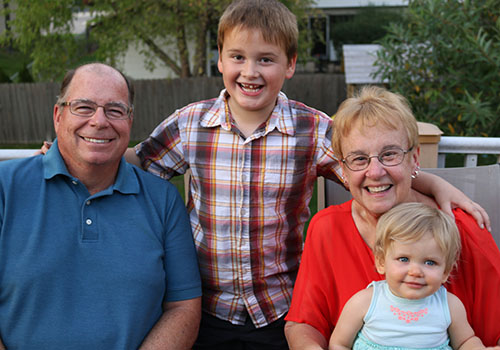Prostate cancer ‘a bump in the road’ for Arlington Heights body shop owner
November 17, 2017

Like many men in their 60s, Jim Irmen has been dreaming of retirement and lazy days spent on a lake fishing, boating and relaxing with family. Jim and his wife of 46 years, Sue, have had a taste of those happy times during countless summer weekends they’ve spent at their second home near the Wisconsin Dells. Nothing—not even prostate cancer—could hold them back from relishing more of those days.
This past February, just as Jim has done every year for many years, he made a visit to a primary care physician, Robert Kapicka, M.D., FACP, for an annual checkup. Sue, who has been a nurse at Northwest Community Healthcare (NCH) for 26 years, reminded her 65-year-old husband he was due for the visit and a check on his prostate-specific antigen (PSA) level. Dr. Kapicka revealed that Jim’s PSA level was in fact elevated, so Jim and Sue went to see David Guthman, M.D., a Urologist with NCH Medical Group.
Why prostate cancer screening is important
Dr. Guthman emphasizes, “Early stage prostate cancer has no symptoms. The only way to detect it early on is by screening. When cancer has spread beyond the prostate, symptoms include bone pain and weight loss.”
Sue recalls, “Dr. Guthman did a repeat of the PSA test to make sure the results were accurate. Jim’s PSA had actually elevated a bit more since his checkup with Dr. Kapicka.”
About a week later, Dr. Guthman performed surgery to biopsy the suspected tumor site. The biopsy revealed Jim had prostate cancer. Fortunately the cancer was caught while it was still confined to the prostate.
Getting treatment options and being in the driver’s seat
Dr. Guthman recommended Jim undergo a robotic prostatectomy, minimally invasive surgery to remove the prostate gland and surrounding tissue using the da Vinci® Surgical System. The benefits of robotic-assisted surgery include less pain, blood loss and scarring than a traditional prostatectomy, in addition to a quicker recovery.
Dr. Guthman referred Jim to Humberto Martinez-Suarez, M.D., another NCH Medical Group Urologist who regularly performs robotic prostatectomies.
“Dr. Martinez-Suarez answered all of our questions,” recalls Sue. “We never felt rushed. We felt very comfortable with him.”
Jim and Sue also consulted with Radiation Oncologist Najeeb Mohideen, M.D., FASTRO, FACR, who discussed various radiation therapy options.
Sue says, “Each of the doctors sat with us and explained what could be done and what our options were. They gave us information to take home and review, and decide what we wanted to do.” She and Jim felt empowered to make the decision that was best for them.
Jim decided to go ahead with the robotic prostatectomy. “We thought, ‘the cancer’s there, let’s get rid of it,’” he says.
Jim underwent the surgery at NCH at the end of April. Sue estimates it took 5 to 6 hours. Jim was in the hospital for 24 hours following his procedure. He remembers, “Within hours, I was up and moving, walking through the hall.”
Jim took a few weeks off of work to recover at home, which went as smoothly as possible especially with Nurse Sue taking good care of him. “By the second week, I was practically climbing the walls and ready to go,” he says.
The worst of it all, Jim says, was wearing a foley catheter for about 10 days. Jim needed the foley post-surgery because it was too difficult to urinate as he normally would.
“Most men undergoing radical prostatectomy recover quite well, particularly with minimally invasive robot-assisted surgery,” notes Dr. Martinez-Suarez. “Men undergoing radical prostatectomy may experience temporary incontinence and possible decreased potency. Most men recover urinary continence within a few months of surgery. The risk of post-prostatectomy erectile dysfunction has been greatly reduced by our ability to perform nerve-sparing procedures using the robotic platform.”
Continued follow-up and encouragement for other men
Prostate cancer screening recommendation
Dr. Martinez-Suarez says, “I recommend routine prostate cancer screening with a PSA test and digital rectal examination annually starting at age 50 until age 75. I encourage African American men who have a high risk for prostate cancer and those with a first-degree relative who’s had prostate cancer to begin screening as early as age 40.”
Jim learned in his follow-up appointment he would not need additional cancer treatment as the cancer had been removed and his PSA level was back to normal.
Every so many months, Jim sees Dr. Martinez-Suarez for follow-up appointments. He has blood tests done at NCH’s lab prior to his visits with Dr. Martinez-Suarez so that the results are ready to be discussed during Jim’s appointments.
“A few months after the procedure, I started telling everyone about my diagnosis and treatment,” says Jim. “I called my brothers. They were surprised, but they looked at it as a matter of encouragement for them to get in for checkups.”
Sue adds, “We caution our son now too. We tell him to make sure he sees the doctor every year and get his PSA level checked.”
Getting back to life
“I can say today I feel great,” says Jim. He feels like his energy level has returned to what it was before his diagnosis. Jim and Sue’s goal was to get through everything quickly and get back to their normal life, and they have.
These days, Jim is back to business as usual at Carstar Ideal Auto Body in Arlington Heights, the family business he’s owned and run for close to 40 years. His son Rob now oversees much of the body shop’s operations, but Jim’s love for cars and the business keeps him close by and connected. When he isn’t at the shop, count on Jim hanging out at his favorite lake, fishing with his 6-year-old grandson or playing with his 1-year-old granddaughter.
To schedule an appointment with a NCH Medical Group urologist, call 847-618-3800.